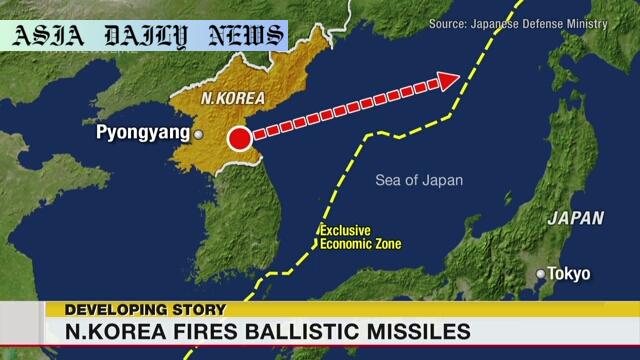Ballistic Missiles: Japan condemns North Korea’s ballistic missile launches, citing a serious impact on security and UN violations.
North Korea launched multiple short-range ballistic missiles, with none entering Japan’s exclusive economic zone.
Japanese Defense Minister condemned the launches, citing public safety concerns and UN resolution violations.
Japan coordinated with South Korea and the U.S. to ensure citizen safety and maritime security.

North Korea’s Latest Ballistic Missile Launch
On Thursday, North Korea conducted multiple short-range ballistic missile launches, marking its first such activity since March 10. The missiles, fired from the Wonsan area near the eastern coast, flew up to 800 kilometers before plunging into the sea. While the missiles did not enter Japan’s exclusive economic zone, the incident highlighted persistent regional tensions. Both Japanese and South Korean officials worked swiftly to monitor the events and assess any potential threats to security.
Japan’s Firm Protest Against Missile Activity
Japan’s Defense Minister, Nakatani Gen, condemned the missile launches, stating that the act posed severe risks to public safety and violated United Nations Security Council resolutions. Japan promptly filed a formal protest with North Korea, stressing the need for abiding by international norms. Nakatani also reaffirmed Japan’s commitment to collaborating with allied nations such as the United States and South Korea to safeguard civilian lives and economic assets.
Collaborative Security Efforts in East Asia
Following the missile tests, Japan, South Korea, and the United States bolstered their efforts to monitor the situation and ensure maritime safety. While no vessels were harmed, the incident brought renewed focus on North Korea’s missile program and its implications for regional stability. Japan’s Coast Guard remained alert, and their prompt communication ensured no damage to commercial shipping. Such incidents emphasize the importance of ongoing diplomatic and defense-related dialogues for addressing North Korea’s military provocations.
Violation of UN Security Council Resolutions
North Korea’s missile launches stand in stark violation of numerous UN Security Council resolutions, which explicitly prohibit the testing of ballistic missile technology. These deliberate provocations further isolate Pyongyang from the international community and exacerbate geopolitical tensions in East Asia. Global powers must navigate this complex situation with a balance of firm diplomacy and preparedness to respond to potential escalations.
Conclusion: Need for Regional Cooperation
The recent ballistic missile tests underscore the importance of international cooperation in dealing with North Korea’s security threats. Japan’s swift condemnation and its collaboration with key allies highlight a united front against such destabilizing actions. As the global community watches, the need for strategic dialogues to prevent future provocations remains paramount.



Commentary
North Korea’s Ballistic Missile Tests: A Threat to Regional Stability
North Korea’s recent ballistic missile launches remind us once again of the fragile state of peace and stability in East Asia. The act not only violates international laws but also demands a swift and coordinated response from affected nations and the greater international community. Japan’s immediate action in lodging a protest and warning North Korea showcases the resolve required to deter such threats. These provocations are a stark reminder of the urgent need for diplomatic solutions in a region fraught with ongoing tensions.
Japan’s Role in Addressing Security Challenges
As a key player in East Asian security, Japan’s response to these missile tests underscores its dedication to protecting public safety and adhering to international laws. The proactive measures taken by Japan, including close coordination with South Korea and the United States, highlight the importance of alliances in maintaining stability. North Korea’s consistent defiance of UN resolutions cannot go unchallenged, and Japan’s firm approach sets a precedent for addressing such actions effectively.
The Importance of Multinational Cooperation
The incident demonstrates how global powers must work together in the face of security challenges posed by countries like North Korea. Joint efforts in monitoring, sanctions, and diplomatic negotiations are essential to curbing Pyongyang’s provocations. Such cooperation not only ensures regional safety but also underscores a shared commitment to upholding international laws and agreements. Japan’s collaboration with the U.S. and South Korea serves as a strong example of how cooperation can play a pivotal role in preventing further escalations.